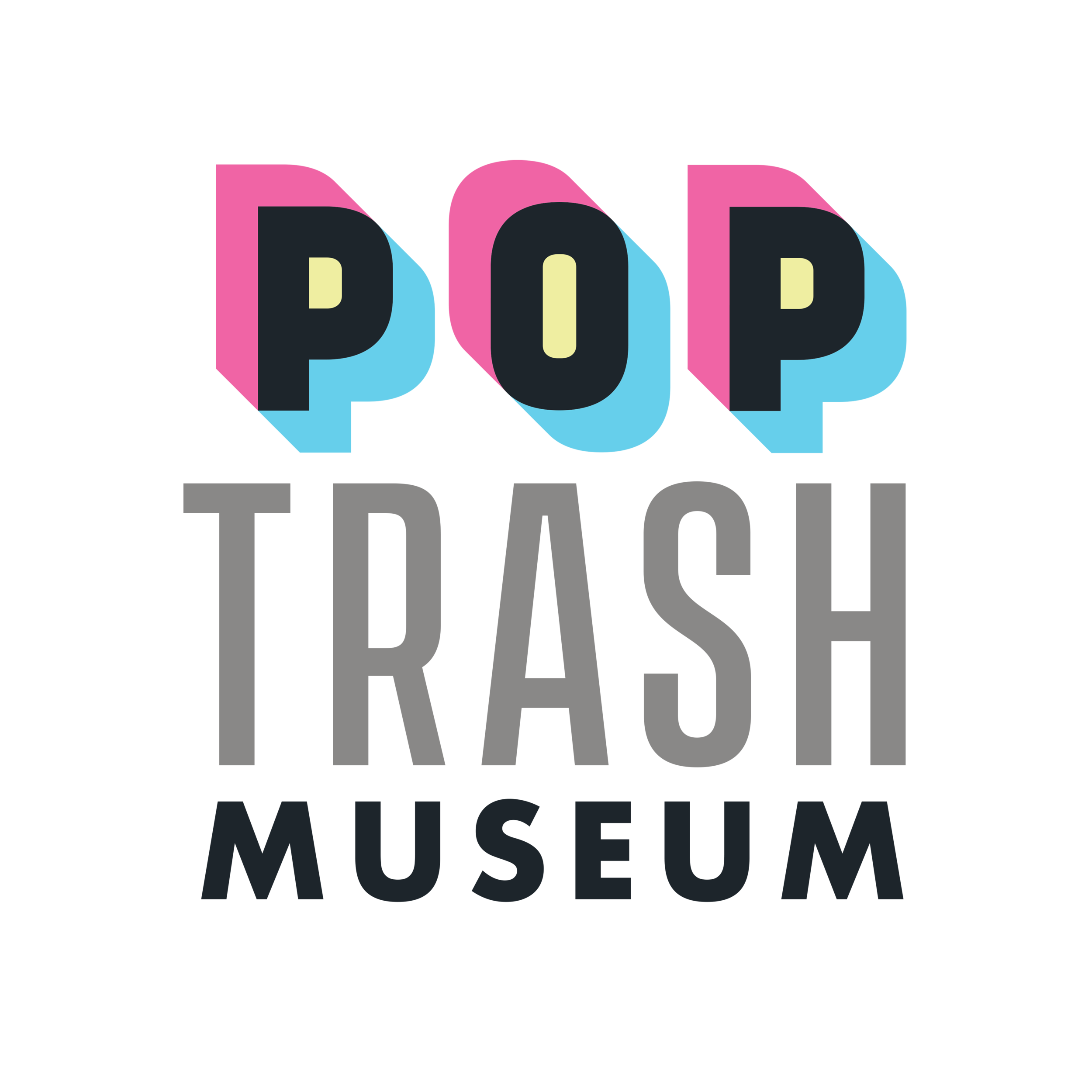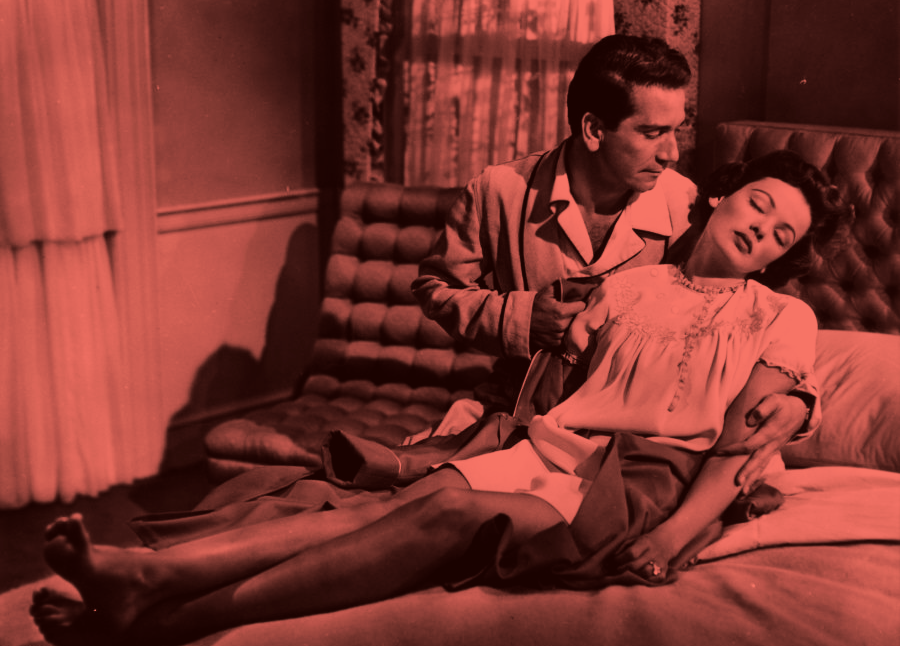Whirlpool (1950)
By Jeremy Breneman and Eric Grigs | January 5, 2022
NEGLECTED FILM REDEMPTION
a series of conversations about forgotten and under-the-radar cinema.
The wealthy kleptomaniac wife of a psychoanalyst falls prey to a charming hypnotist. Later found at murder scene, she has no recollection of what happened and seemingly no way to prove her innocence.
Eric: What an attention grabbing title! Whirlpool! I’m hooked immediately. I feel a little like movies now aren’t trying hard enough! Where’s the drama? Where are the titles phrased as mysterious questions?
Jeremy: Well, some ad campaigns heralded the tagline, “What might a woman do if she is hypnotized? Ask Ann Sutton!” And the more perplexing, “Tomorrow she will know what she did tonight!” Both show a menacing male figure standing over a fearful Gene Tierney on her knees.
Eric: The trailer for the film feels quite shocking, with its question: “Can a man make a woman do things she doesn’t want to do?” Your first reaction to that is not to think “hypnotism.”
Jeremy: It’s clearly setting this film up to be an uncomfortable experience, and at times, it truly is…over seven decades later!
Eric: But what a great film to kick off my “Noirvember” viewings!
Jeremy: And this November actually marks the 30th anniversary of Gene Tierney’s passing. Let me just say, there are few actresses of the Golden Age of Hollywood that I love as much as Tierney. To discuss this film, I’m slightly biased from the get go.
Eric: I’m not sure why Gene Tierney was not on my radar before recently. Am I wrong thinking when people talk about old movies, her name rarely is mentioned?
Jeremy: I think her obscurity pretty much depends on who discovers her classics. Tierney was one of those actresses who reached their pinnacle fairly early in her career. Films like Laura, Leave Her to Heaven, and The Ghost and Mrs. Muir pretty much cemented her place in film history. Her last acting credit occurred in 1980 and her filmography after 1955 was pretty sparse.
Eric: On a blind buy, I bought the Criterion of Leave Her to Heaven (I mean, again, the title called out to me!) and was just gobsmacked. I decided I needed to see more of her work. That led me to Whirlpool. And Laura is queued up next!
Jeremy: Of course Laura needs to bolt to the top of your watch pile list! I also realize Gene Tierney made some lousy movies (Never Let Me Go, you’re guilty). Her best performances came from working with a director who got her slightly obtuse screen presence and knew how to exploit it to the film’s advantage. Otto Preminger was that director for Tierney. I kind of think there was an obsession with capturing her essence on screen. It worked in legendary proportions with Laura earlier in the decade and kind of hit its peak, with perhaps lesser success (but still winning) in Whirlpool. There is no doubt Gene Tierney is the star of this film, even if her character seems lost at times.
Eric: You’re right, she’s slightly underused here, absent for some stretches of the film (hey, she’s sent to jail!), but every minute when Tierney’s on the screen she completely commands your attention.
Jeremy: I think her struggles with manic depression and subsequent institutionalizations pretty much ended her career for a bit. It never completely recovered when she resumed it in the 1960s (thanks to Preminger—a Tierney cheerleader for decades—who insisted on casting her in 1962’s Advise and Consent). I do feel her struggles with mental illness in real life likely informed Tierney’s performance here and makes the proceedings of Whirlpool even more potent, considering this noir revolves around psychotherapy.
Eric: That’s so sad to hear she struggled with mental health issues which derailed her career from becoming much bigger. But, as you mention, it makes her performance of Ann’s struggle against her repressed memory even more relevant.
Jeremy: It’s also firmly grounded in the post-war paranoia of Communist mind control which permeated wartime and the years following, like a bad case of post-traumatic stress disorder.
Eric: The paranoia snuck up on me. In somewhat unexpected ways—especially for a movie called Whirlpool!
Jeremy: In the film, Ann’s husband (Richard Conte) is a psychoanalyst working with soldiers and their “shell shock.” Jose Ferrer’s character David Korvo is working on using his skills of mind control on unsuspecting women. The film just boils over with paranoia, don’t you think? Of course many noirs deal with paranoia, but this film seems obsessed with it.
Eric: Korvo was deliciously controlling from the first scene in the department store where instantly sees the opportunity to rescue Ann from the store detectives when she’s caught pilfering jewelry. His smooth and eloquent defense of her actions quickly sets up how she loses control of her secret and will become beholden to him.
Jeremy: What is behind Ann’s kleptomania? The match-point of the entire narrative! I found it curious in the late 1940s and 50s, kleptomania seemed to be up there with homosexuality in shame factor! If only Ann had been honest with her hunky psychoanalyst husband, the trouble she’d have been spared. That there is a connection between kleptomania and destruction of her husband’s professional reputation seems a bit hyperbolic by today’s standards, but I guess then it was pure scandal!
Eric: The cascading events rely on her high society shame. Kleptomania seemed like cry for attention from her husband perhaps. Stealing the brooch after the salesperson shows it to her and just walking out feels sloppy—unless you want to be caught. But what a great start to the film and a superb setup for Korvo’s blackmail and control over Ann! The first half of the movie I was kept guessing as to what his ultimate motive may be.
Jeremy: And boy is it sinister! That’s a lot of the brilliance of this film. Your belief in the intentions of the characters seem to shift as the story progresses. That’s not an uncommon device of noir, but I think Otto Preminger uses it to clever ends here.
Eric: Speaking of Ferrer, who wouldn’t be controlled by his calm, deep voice? Every time he spoke I was hypnotized too!
Jeremy: It’s easy to see why Rosemary Clooney was so hypnotized too…and had babies with him! He’s such a fine actor and he’s been given some great material here! Of course, the following year he would win the Best Actor Oscar for Cyrano de Bergerac. He’s a master villain, a role he would revisit for the rest of his long and storied career.
Eric: In terms of the supporting cast, there were some other real gems too.
Jeremy: Barbara O’Neil (best known for playing Scarlett O’Hara’s mother in Gone with the Wind) as a rich socialite character is thrown into the mix. I loved her skunk highlighted black hair. I didn’t realize how important she was going to be to the plot of the film.
Eric: Me neither. Her character was fascinating—from the powder room warning to stay away from David Korvo to her therapy session recordings, and then her surprising murder!
Jeremy: Why is it middle-aged women always seem to be pitiful and doomed in noir films? O’Neil plays her with a great deal of sympathy while initially coming across as arrogant. She’s essentially a sitting duck for knocking off.
Eric: For quite a while I was also unsure if Ann’s husband was really on her side or if there was going to be another twist! Maybe I was swept up in all the gaslighting and mental games?
Jeremy: Yes, we can’t end without talking a little about Richard Conte, who was probably one of Hollywood’s hardest working but sorely overlooked actors of the Golden Age of Hollywood. His rather rugged and unconventional good looks really threw out a great deal of screen chemistry. The man worked with just about every leading lady you can imagine—a Kevin Bacon before Kevin Bacon was even born. Well, that might be going a bit too far! In so many of his films he played the heavy, and it’s wonderful to see him play a sympathetic character in this film. He was such a gifted actor and you don’t hear much about him anymore, even though he is a presence in so many film noir films. He spent the last part of his career and life making films in Italy, with one of the last titles being an Italian faux Exorcist sequel (The Return of the Exorcist), among other Italian action films at the end. For those who love pop trash, that genre and his participation in it deserves its own article. He did manage to get some final recognition when he was cast in his last Hollywood-produced film The Godfather. At least Coppola saw to it he was not relegated to obscurity. I’m really gratified we can talk of him a little bit, as he truly deserves more attention. I highly recommend his film prior to Whirlpool, Jules Dassin’s shot at American noir where Conte gets top billing in Thieves Highway.
Eric: So how do you feel Whirlpool fits into the noir canon?
Jeremy: To me, Whirlpool is part noir, part melodrama, but the biggest part psychological thriller.
Eric: What I like about Whirlpool’s place in the noir genre is it seems more female-focused (although maybe not woman-driven because the men around Ann seem to do all the solving and saving), but it does make me want to find and watch more of these noirs that are crossed with melodramas. Maybe that was the subtext for female viewers of the time: Ann was unsatisfied with domestic life, the traditional women’s roles of the time—which fed into her kleptomania—urges and desires to do things for herself. Even Korvo says as much, appealing to her to get out from under her husband’s control. However, his solution is to just be controlled by someone else!
Jeremy: I tend to think Ann Sutton was a reflection of the newly rehoused wives of the post WWII era. I mean, they went from housewives to working in the factories for the war and then suddenly were thrown back in the kitchen to resume their “wifely duties.” Is it little wonder neurotic tendencies followed? Ann is like the ‘Everywoman’ at the time, at least for the housewives of that generation! Why wouldn’t they be drawn to the melodrama in this brand of noir?
Eric: Well said. But then what does this say about me and my penchant for these 50s melodramas? Maybe I’ve been hypnotized!
Jeremy: Haven’t we both?
Jeremy Breneman and Eric Grigs have been obsessing together over lesser-known film curiosities for the past year. Previous entries in this discussion series have included Will Success Spoil Rock Hunter?, Foxfire, Lucky Lady, The Killing of Sister George, Hilda Crane, and a William Castle Double Feature of Homicidal and Mr. Sardonicus.





